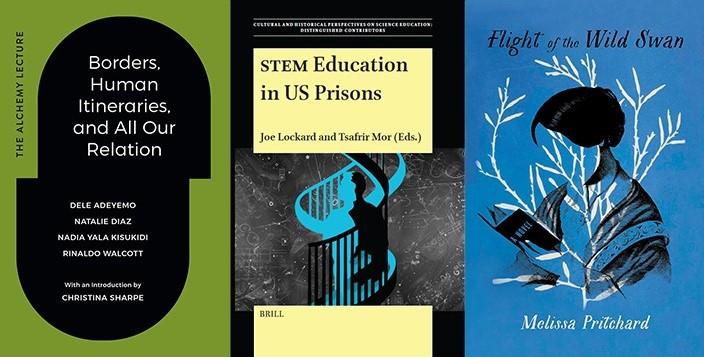By Kristen LaRue-Sandler — February 13, 2024
Three faculty members in the ASU Department of English announce new books recently launched or forthcoming this spring. Publications include collected public lectures, a volume of essays, and a novel that explore topics such as philosophical and physical borders, STEM education in prisons, and Florence Nightingale.
'Borders, Human Itineraries, and All Our Relation: The Alchemy Lecture' (Duke University Press, 2024)
Natalie Diaz is the co-author of this volume which includes her address for the first annual Alchemy Lecture at York University along with those of “co-alchemists” Dele Adeyemo, Nadia Yala Kisukidi and Rinaldo Walcott. From the publisher:
- "The first annual Alchemy Lecture brings four deep and agile writers from different geographies and disciplines into vibrant conversation on a topic of urgent relevance: humans and borders. “Borders, Human Itineraries, and All Our Relation” captures and expands those conversations in insightful, passionate ways. Architect, artist, and urban theorist Dele Adeyemo (UK/Nigeria) calls attention to the complexity of Black infrastructures, questioning how “the environments that surround us condition the possibility of our being.” Poet Natalie Diaz (US/Mojave/Akimel O'odham) writes, “Like story, migration is the sensual movement of knowledge,” and asks, “What is the language we need to live right now?” Philosopher Nadia Yala Kisukidi (France) suggests there is no diasporic life “without the dynamics of fabulation, where we pass down, from generation to generation, the stories of our ancestors who walked barefoot for many months.” And cultural theorist Rinaldo Walcott (Canada) asks us to consider inheritances beyond white supremacist logics: “What might it mean to live a life, if we can’t risk desiring and working towards utopia?” As each alchemist considers the legacies of anticolonial struggle, the future of the planet, and the textures of Black and Indigenous life, their essays speak to each other in multiple ways, creating something startling and revelatory: a vision of the world as it is, and as it could be."
Diaz is a professor in the Department of English’s creative writing program, where she holds the Maxine and Jonathan Marshall Chair in Modern and Contemporary Poetry and directs the Center for Imagination in the Borderlands.
'STEM Education in US Prisons' (Brill, 2024)
With Tsafrir Mor (ASU School of Life Sciences), Joe Lockard edited this volume in the press's Cultural and Historical Perspectives on Science Education series. From the publisher:
- "Renewal of higher-education programs in US prisons creates a need for science education. This is the first book to address STEM education in prisons in the United States. It calls on activist science teachers to develop innovative ways to teach in challenging carceral settings.
Over the last fifty years, science education and prison education have moved in different directions, one expanding and the other contracting. This book brings these educational endeavors into cooperative engagement. Democratic citizenship opens opportunities for all people, irrespective of civil status, to study science. The book presents student narratives and case studies emphasizing the achievements of STEM education behind prison walls. STEM education equity can help address the deep social inequities that mass incarceration creates and magnifies."
Lockard is an associate professor in the Department of English’s literature program.
'Flight of the Wild Swan: A Novel' (Bellevue Literary Press, 2024)
Melissa Pritchard’s historical fiction take on the life of Florence Nightingale, set for release in March, has garnered starred reviews from Kirkus and Publishers Weekly. From the publisher:
- "A majestic novel of Florence Nightingale, whose courage, self-confidence, and resilience transformed nursing and the role of women in medicine
Sweeping yet intimate, “Flight of the Wild Swan” tells the story of Florence Nightingale, a brilliant, trailblazing woman whose humanity has been obscured beneath the iconic weight of legend. From adolescence, Nightingale was determined to fulfill her life’s calling to serve the sick and suffering. Overcoming Victorian hierarchies, familial expectations, patriarchal resistance, and her own illness, she used her hard-won acclaim as a battlefield nurse to bring the profession out of its shadowy, disreputable status and elevate nursing to a skilled practice and compassionate art.
In lush, lyrical detail, Melissa Pritchard reveals Nightingale as a rebel who wouldn’t relent—one whose extraordinary life offers a grand lesson in inspired will."
Pritchard is a professor emeritus in the Department of English’s creative writing program.
